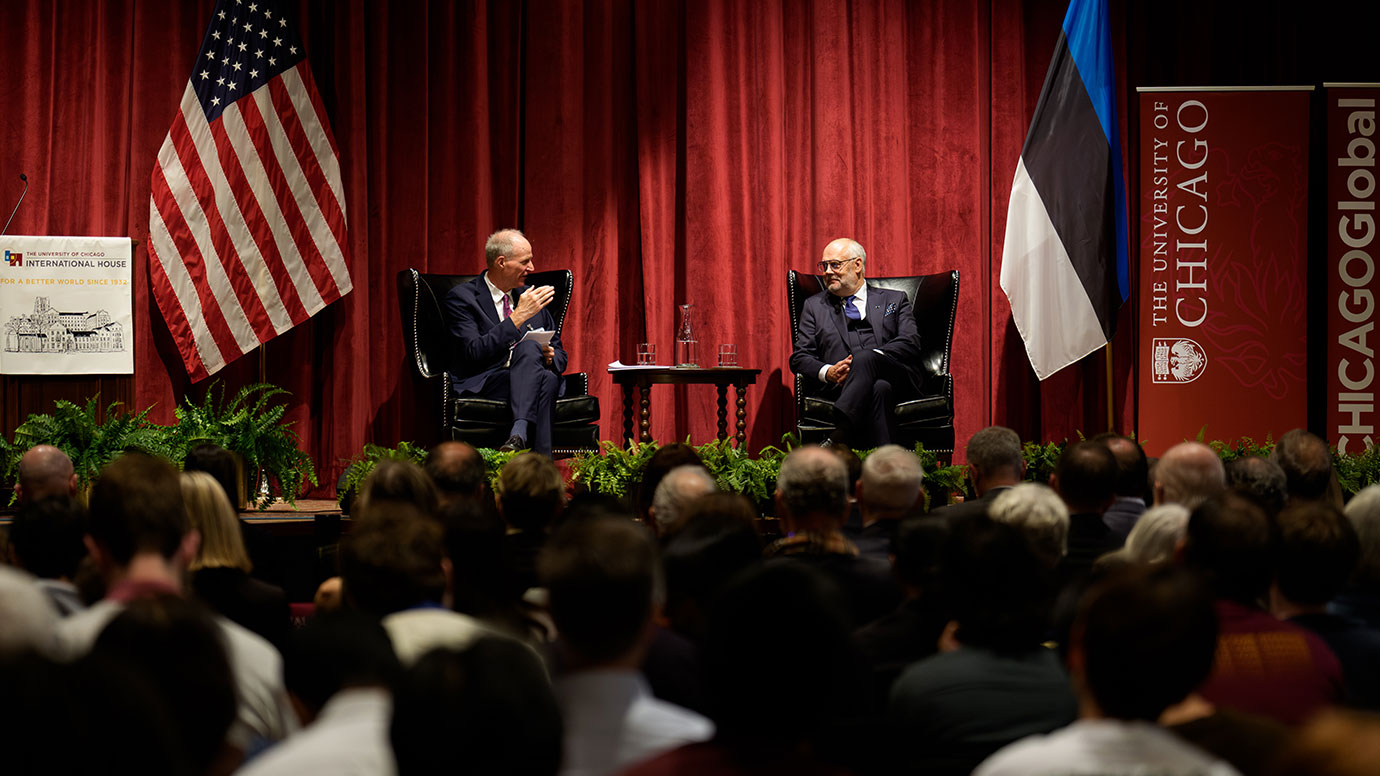Small in size but big in vision, Estonia has become a global model for digital democracy.
On Oct. 27, President Alar Karis visited the University of Chicago to share how innovation and “leading by example” drives his Baltic nation’s resilience and reform.
Madhav Rajan, the dean of the UChicago Booth School of Business, introduced Karis, pointing to his unique background as a biologist and molecular geneticist who transitioned into the world of politics. Speaking on campus by invitation of the University of Chicago International House, Karis has since 2021 led one of the most digitally driven and advanced countries in the world.
“Having an academic background creates difficulties—you don’t have time to really go deep into a topic, even when you want to,” Karis said. “I’m trying to tell people that education is important, that research is important. It helps, even during difficult times, to put money on innovation.”
John Mark Hansen, the Charles L. Hutchinson Distinguished Service Professor in the Department of Political Science and the College, was the conversation portion moderator. He engaged Karis in dialogue about the primary focuses of Estonia today, such as the war in Ukraine and AI development.
Over the course of the event, Karis described the role of UChicago economic thought in the establishment of the post-communist Estonian economy. Karis also emphasized the importance of reinforcing both economic and political freedom and the shared perspectives of small countries on the world stage.
“Digitalization [in Estonia] has done more than make bureaucracy efficient,” he said. “It has also reduced corruption, increased transparency and supported democratic development.”
Though Estonia had been an independent state before World War II, Karis explained, the fall of the USSR left the economy in need of rebuilding after years of dependence on Soviet markets.
“The intellectual foundation that guided us came, to a surprising extent, from here, from the University of Chicago,” Karis said of those reforms.
Inspired by the work of UChicago scholars such as Milton Friedman, Estonian leaders turned to neo-liberal macroeconomic structures to build a reliable, open economy.
“The kinds of ideas championed in Chicago,” Karis said, “provided the foundation for long-term trust and resilience in the Estonian economy.”
Though a small country with less than 1.4 million citizens, Estonia has emerged as a global leader in the realm of cybersecurity. Following an unprecedented Russian cyberattack in 2007, Estonia responded by growing their technological capabilities in order to be protected in the future, Karis told the audience and Hansen.
Now, in the emerging era of AI, Estonia aims to continue to lead by example, rather than by pure global influence. Rather than be fearful of the new technology, Karis told Hansen, we must learn how to use it to enhance learning. He pointed to a new program aimed at teaching Estonian teachers to use AI that he said could become an international model.
“Estonia is small, but that makes us fast, adaptable and unafraid of experiment,” Karis said.
In its foreign relations—and being a NATO state bordering Russia—Estonia has faced newfound challenges in the years since the invasion of Ukraine. In fact, Estonia has seen such a large influx of Ukrainian refugees that 3% of the current Estonian population is Ukrainian.
Karis explained that his primary goal is to help these refugees by providing them with shelter and education until they are able to return home. He also emphasized that the war doesn’t just affect bordering nations, it affects everyone.
In speaking of the war in Ukraine, Karis highlighted his appreciation for Estonia’s membership in NATO and friendships with neighboring countries. He noted that Estonia and other small countries are particularly vulnerable to attacks, Karis explained, but by joining regional bodies—such as NATO and the EU—Estonia has gained a stronger sense of security.
Reflecting on the heightened relevance of these supranational organizations, Karis noted that the war in Ukraine prompted Sweden and Finland to join NATO—just a few of the major geopolitical changes sparked by the conflict.
“Freedom is never finished,” Karis said. “It requires continuous care, debate and defense. Especially in times of global uncertainty.”
